I can say two things with total certainty: I’m queer, and I am a “Bob’s Burgers” expert. Truly, I watch “Bob’s” on a loop; it’s unfailingly consistent, down to callbacks to prior episodes in its background illustrations, which makes it the perfect panacea for the craziness of the world. My zeal for “Bob’s Burgers” was part of the fabric of my life well before my bisexuality was — but here they are, converging. I’ve studied the show, collected the evidence, and now I’m ready to tell you which “Bob’s Burgers” characters are bisexual as fuck.
Bob
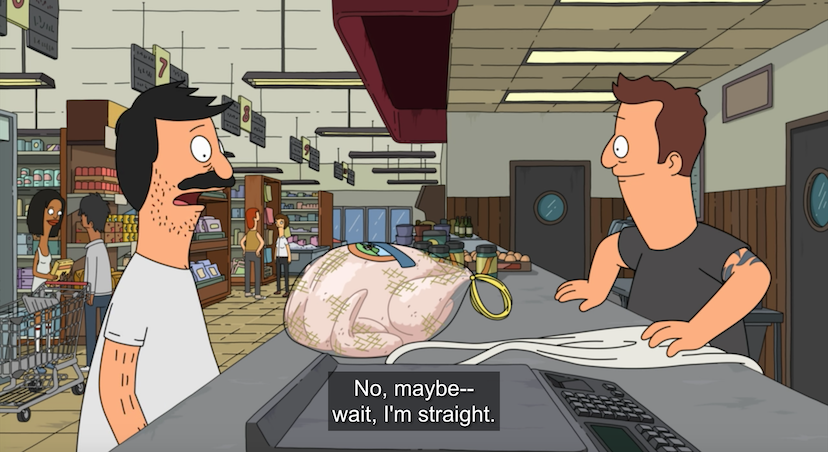
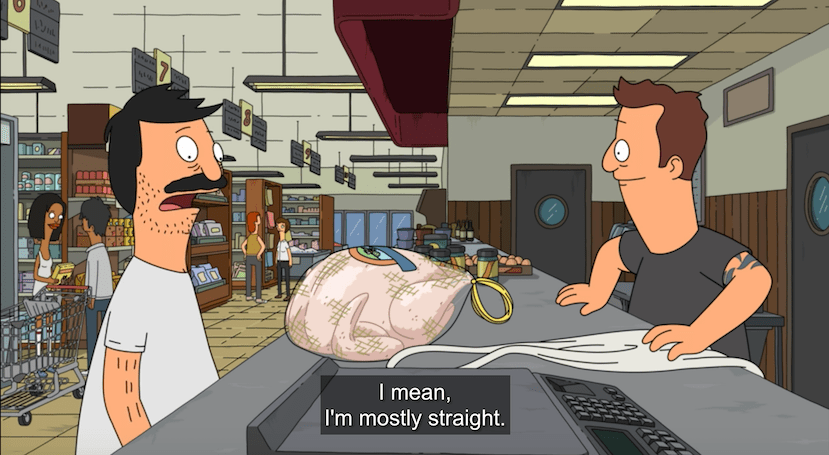
It’s easy to make the case that the show’s titular, unlucky burger chef is bi, since Bob’s sexuality is basically canon. It starts in season four’s “Turkey in a Can” when Bob’s Thanksgiving turkeys keep getting ruined; after repeat trips to the grocery store for a new turkey, Bob attracts the attention of a guy behind the deli counter who’s convinced Bob has actually returned so many days in a row because he’s working up the nerve to flirt.
“I’m straight,” Bob insists. “I mean, I’m mostly straight.” In season nine’s Halloween episode, Bob asserts that the town’s new, hot handyman is objectively attractive but isn’t his “type.” Sounds a lot like when I watched the first season of Orange is the New Black. Just saying.
I’d normally call it a cop-out for a show to allude again and again to a character being queer without ever making it part of the plot. I’d normally be pretty annoyed about the representation being off-screen only. (There are three things you should never ask my opinion on at a party, and one of them is the exists-only-in-my-mind — and probably on fanfiction.net — “Full House” sequel/“Fuller House” prequel that explores the must’ve-happened doomed love between confirmed bisexual Stephanie Tanner and her Faith-Lehane knock-off friend, Gia. But anyway…)
I’ll make an exception for Bob. From the show’s early days, we know Bob has two great loves: his wife Linda, and burgers. Still, I’m holding out hope that the writers will use their talent for flashbacks to show us Bob’s ex-boyfriend. In a show with nearly perfect continuity and a history of turning one-off bits into full-on storylines in subsequent episodes, I don’t think it’s far-fetched to hope a couple of jokes establishing Bob’s bisexuality pan out into something meatier (pun intended).
Zeke
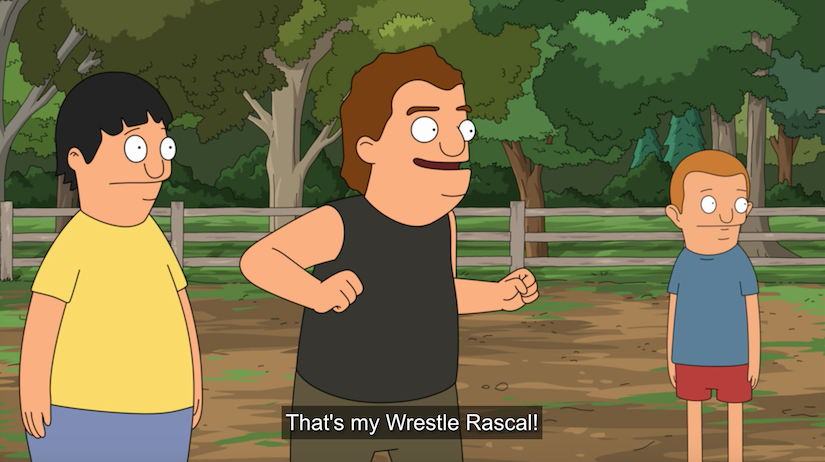
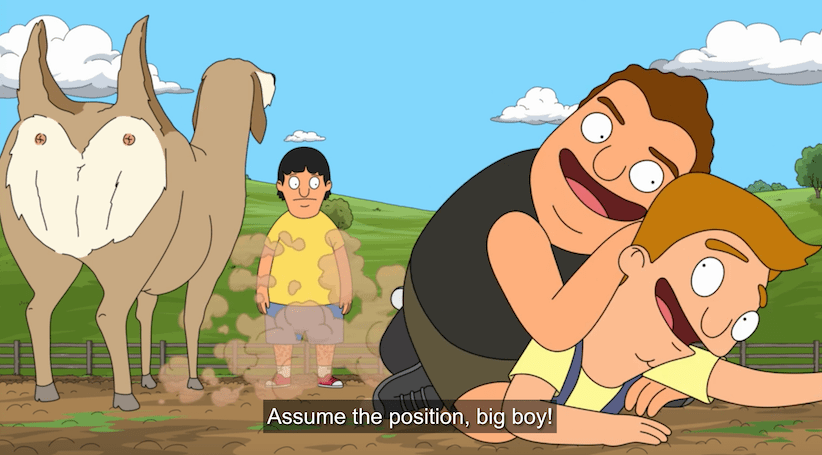
Zeke is going to be one of those bi adults who looks back on their childhood and realizes that when they weren’t clumsily pursuing someone of a different gender, so much of what they did was very, very gay.
So, all of us.
Tina Belcher’s super-southern classmate is allegedly obsessed with wrestling, but to me, it looks like grappling is a guise that gets him up-close and personal with his best friend Jimmy Jr. Like when you really want to french braid your best friend’s hair.
Not wrestling-related, but please observe how unfailingly, affectionately supportive Zeke is of Jimmy Jr.’s terrible dancing. Then try to tell me that’s not dancing only a wannabe-boyfriend could love.
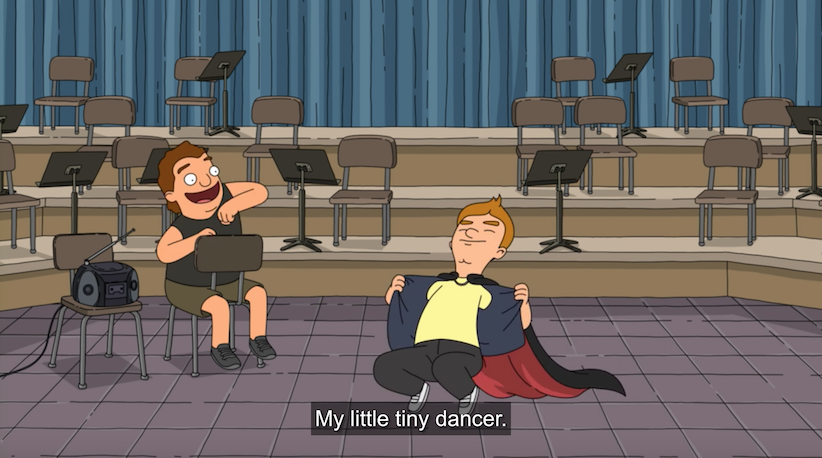
Aunt Gayle
Linda’s sister Gayle owns a crap-ton of cats, writes poetry, and wears ugly-cute slip-on shoes.
Enough said, right? Wrong.
There’s this amazing line, which embodies dating as a bi woman who doesn’t yet realize she connects best with women:
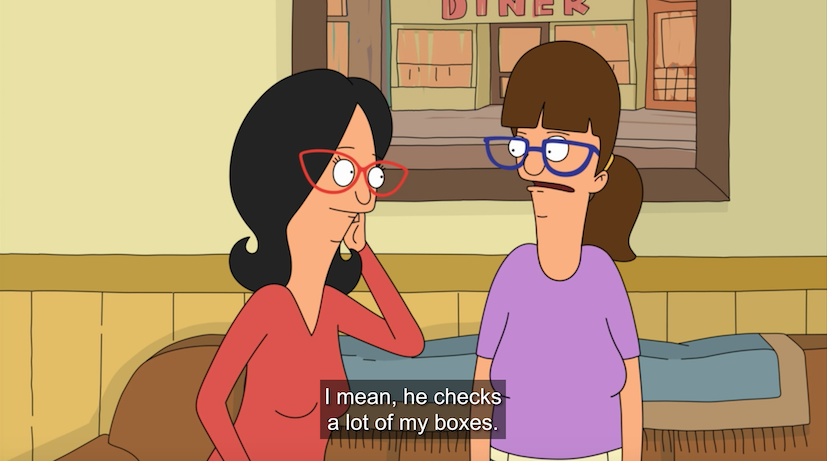
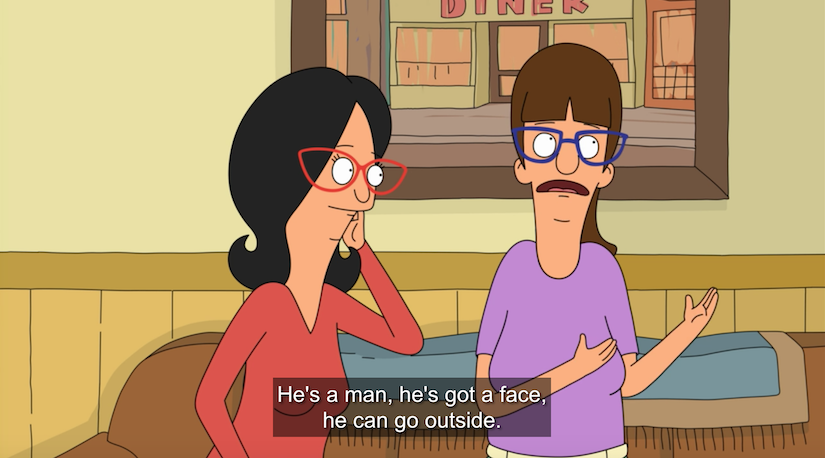
Finally, in the same episode where Bob professes to be “mostly straight,” Linda tells Bob that her sister will be spending Thanksgiving at their apartment because there’d been a fire at Gayle’s place. How’d Gayle start a blaze? Well, it involves a prophalyctic I’ve only ever heard discussed among queer women (and one trying-to-be-edgy son of a dental professional).
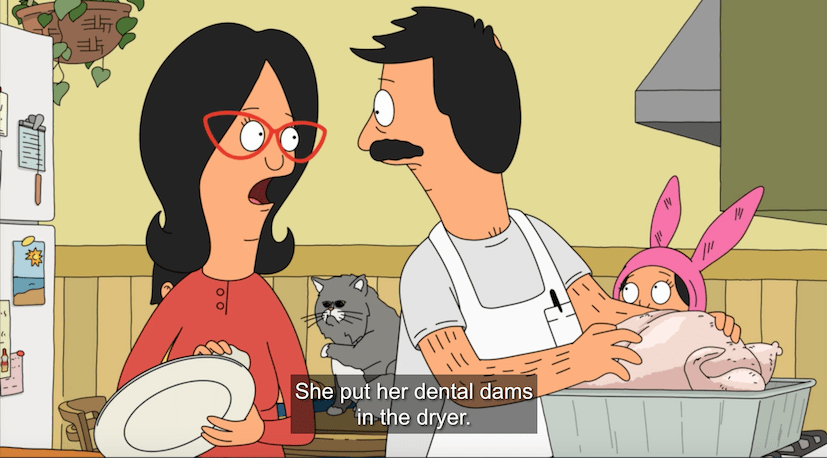
Nat
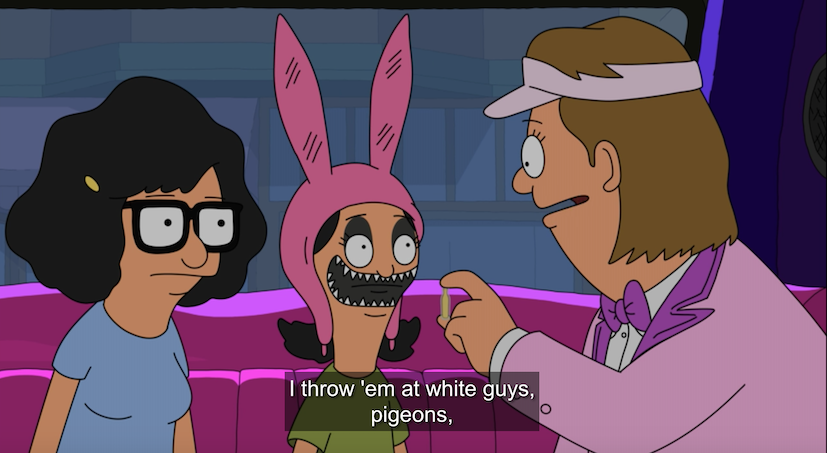
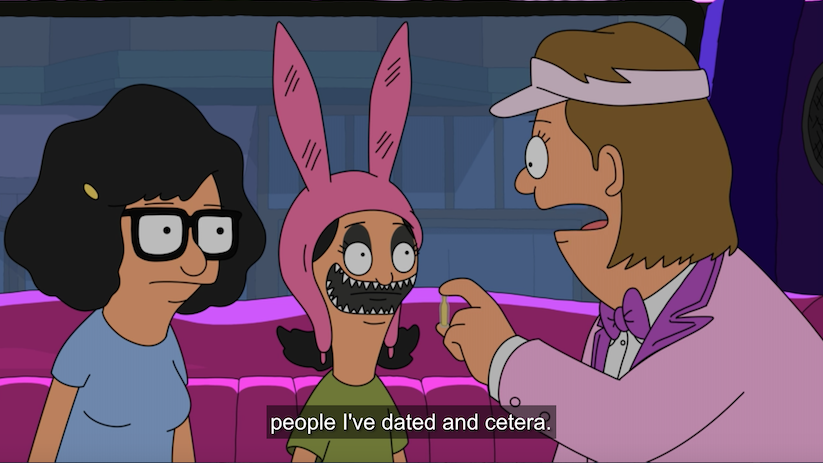
Nat, the be-suited, masc-of-center limo driver from season eight’s “V for Valentine-detta” is clearly a queer woman. If you need proof beyond her visor and matching suit, she also keeps stink bombs in her limo’s glove compartment so she can work out some really specific (but not gender-specific) aggression.
She says “people,” people!
Nat can sit next to me forever, too.
Mandy
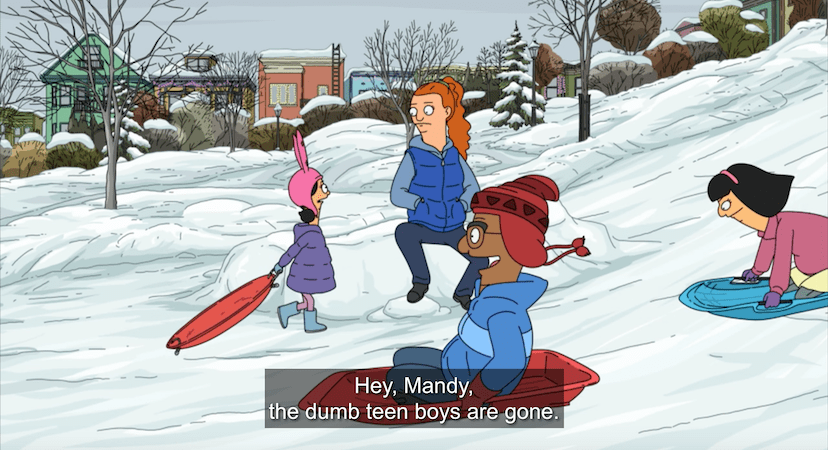
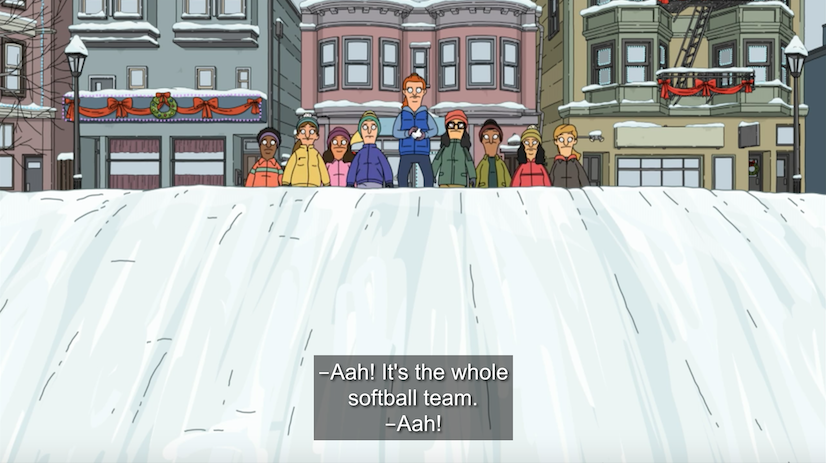
Aside from Bob, Mandy is the show’s most obvious-but-unconfirmed queer character. We meet Mandy in season nine’s “Better Off Sled,” when the high school softball star is called in to save the Belcher kids and their friends from the teens who’ve been pelting the group with snowballs.
Mandy strides toward the group with the confidence of Xena, Warrior Princess; Louise immediately compares her to Brienne of Tarth, a character who I’m convinced is gay even though I’ve been told otherwise, repeatedly.
Mandy pummels the bullies with snowballs and then sits on their fort like the avenging (gay)ngel she is:
When Mandy’s original onslaught of snowballs isn’t enough to keep the boys from terrifying the younger kids, Mandy returns with reinforcements — her softball teammates.
And the girls’ basketball team.
AND the girls’ lacrosse team.
No one can tell me Mandy won’t grow up to play professional softball and win the hearts of adoring queer women the world over; it won’t matter whether there’s a dude cheering for her from the sidelines, or if she finds the Sue Bird to her Megan Rapinoe.
As “Bob’s Burgers” heads into its tenth season, I can only hope that it’ll come back … well … Linda said it best.
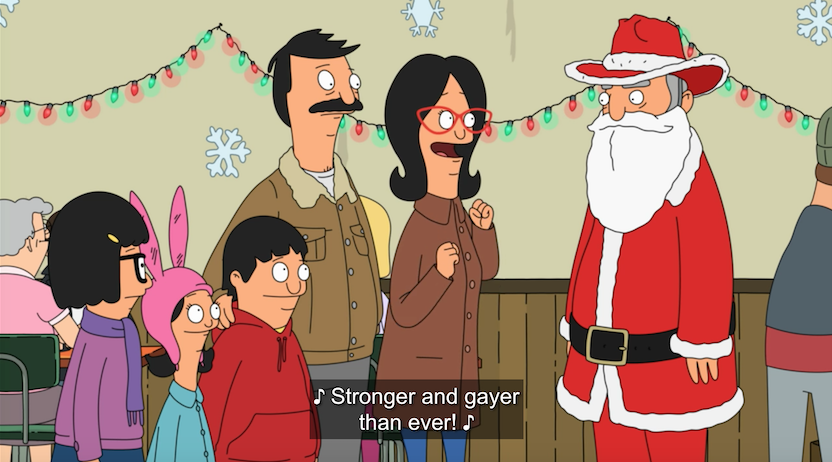

THIS IS THE BOB’S BURGERS CONTENT I’VE BEEN WAITING FOR. I have it on a loop too. My roommate and I have been saying Bob is bi for years, and Nat rang all my queer alarm bells the moment she came on in a bright pink suit and accidentally fell on a (dud) hand grenade. Thank you, Lisa. Will save this for future hypothetical Bob’s Burgers arguments at parties.
Holy cow. This is the best and truest thing ever written.
What about Gene?
There are a few characters who didn’t make my cut but should’ve, and Gene is 100% one of them. Every Gene and Alex episode … every Gene and Zeke interaction … There is so much there!
I know this is your first Autostraddle piece. You are done now. No more is required, needed from you . This is your zenith, your celestial summit. (Unless you want to write more about Bob’s Burgers. Then please, yes. )
^ Please write more about Bob’s Burgers.
This person is trying to be complimentary but they’re wrong! Write lots of things about lots of things!
Including more about Bob’s if you want :)
I <3 Bob's Burger soooo much and this is A++++ content :D
This is AMAZING! My partner and I have watched each episode probably three dozen times and you nailed it with this list!!
Bob and the tattoed meat department guy is just the cutest most ridiculous thing ever. I adore that episode.
I would argue Bob and Marshmallow had a bit of a thing waaay back in season one. “Oh hey Marshmallow.” The transwomen in that episode are portrayed in a very dated way BUT are welcomed to the party and treated as valid people, which I love, and Marshmallow even becomes a recurring character.
Nat the Limo Driver makes me wonder if Louise isn’t going to grow up and realize how bi she is too. Nat’s affirmation of her monster face makeup is an example of An Old Queer Validating A Might-Be-Baby-Queer if I’ve ever seen one. Nat is reportedly going to show up in the Bob’s Burgers movie!
Anybody else pick up on Tina’s polyamory? Dating the entire zombie basketball team..making two boys have a dance off to win the right to take her to her school dance, then saying she’d rather just be with both of them..and imho the biggest giveaway of all, the “Just one of the Boyz4Now for now” episode where the punch line is “the right number of boys for you is four, forever!” The “No pants in space” fantasy sequence reads sooo gay …Tina just wants to be a throuple with a couple bi boys if you ask me!
I also had thoughts about Louise being bi when she’s older and Gene is defiantly not straight, yes has had multiple crushes on girls but he’s clearly a bit camp if you ask me and in a few episodes he dresses up as a girl, and can even been seen once stuffing his shirt to look like he has breast (season 10, I can’t remeber the episode but it’s right at the start and Linda tells him to stop messing arround) so maybe that’s something to think about too, it would also be so cool to see him and Zeek together some more
yes this. just a solid screech of “this”. also can we talk about the fabulous Marshmellow?
This is exactly the kind of content I come to Autostraddle for. YES YES YES to Zeke being bi. He’s low key a great character, always so supportive and forthcoming! Nat is one of my fav non-main characters! That episode was SO funny. She’s so obviously queer, I hope we see her in the future.
This is perfect! I always had a feeling Fraund(sp?) might be bi too, cause he also has many cats, and why not have the bi dude go out with a bi woman? I also get vibes from the librarian, but I think he’s gay, not bi. But, then he knew the witch Tina was beefing with, but forget if he dated her or just was in the same queer circle as her.
Nat is not queer nor is she masc, she’s a butch lesbian. Learn our history and learn why it’s so insufferable to always have bi people or even gay men erasing us. She could not be any more explicitly a butch lesbian and yet you somehow leave it up to speculation.
They say theses things on this because IT’S FUNNY, motivefor laught.
I was with you until you mentioned Brienne of Tarth LOL. She’s very clearly hot some incredible feelings for Jamie. Denying that is to deny what the creator has put to Paper and confirmed in interviews time and time again. Maybe don’t willingly pull a veil over your eyes just so you can see characters of hour choosing as gay? Essentially imposing sexuality on others, fictional or not.
Lots of stereotyping in this article too.